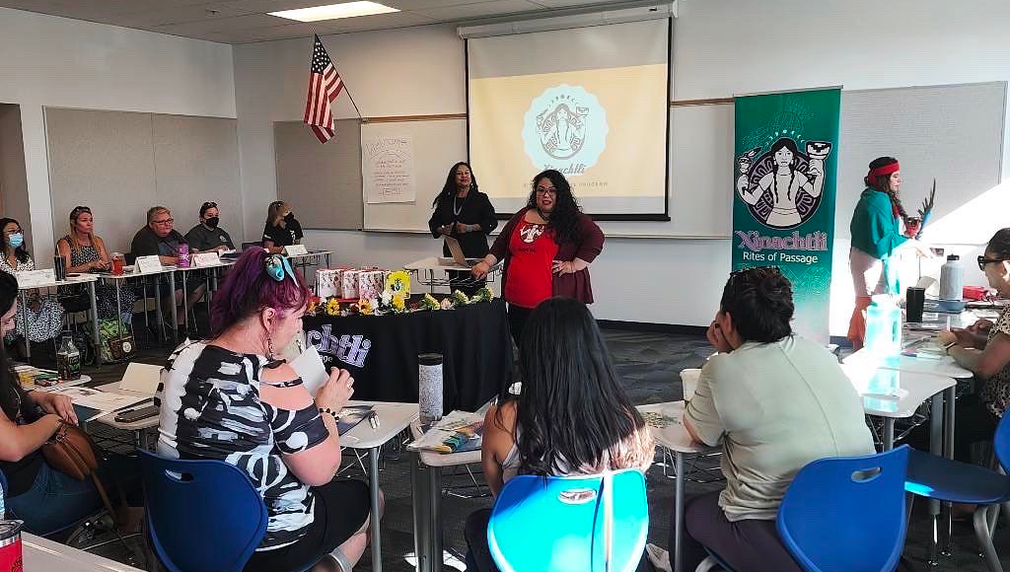Project THRIVE
KLBRI’s Project THRIVE expands the Los Angeles social justice ecosystem by uplifting the well-being of social justice leaders, advocates, and organizations. Through culturally responsive and healing-centered leadership development offerings, Project THRIVE will provide essential mental health and holistic wellness services to communities in need. Those supported by Project THRIVE will include immigrant street vendors, systems impacted Latina and indigenous youth, as well as social justice leaders and advocates residing in Los Angeles County.

Please list the organizations collaborating on this proposal.
Los Angeles Indigenous People's Alliance Xinachtli Rites of Passage Latinx Therapy Community Power Collective
What is the primary issue area that your application will impact?
Immigrant and Refugee Support
In which areas of Los Angeles will you be directly working?
Central LA
East LA
San Fernando Valley
South LA
West LA
Antelope Valley
County of Los Angeles
In what stage of innovation is this project, program, or initiative?
Expand existing project, program, or initiative
What is your understanding of the issue that you are seeking to address?
The growing social and political inequalities currently threatening immigrant and refugee communities have exacerbated the impact of burnout among social justice leaders, advocates, and organizations. Collective racial trauma impedes a community's ability to thrive. Approximately 81% of social justice leaders suffer from higher rates of chronic illness, mental health issues, and burnout. From 2010-2019, reported crimes against street vendors in the city of Los Angeles rose nearly 337%. Latina and Indigenous youth still have some of the highest rates of domestic and sexual violence and are targets of systemic forms of oppression. The burden of of creating safe and thriving communities falls on immigrants and community members themselves since they are often criminalized by law enforcement. KLBRI partners with Los Angeles street vendors, youth serving organizations, mental health service providers, and the social justice community improving outcomes for immigrants and youth.
Describe the project, program, or initiative this grant will support to address the issue.
Project THRIVE expands the Los Angeles social justice ecosystem by uplifting the well-being of social justice leaders, advocates, and organizations. Project THRIVE builds on pre-existing healing-centered leadership curricula proven successful in practice by KLBRI. Such curriculum includes the Xinachtli Rites of Passage and Community H.E.A.R.T (Healing from Ethno and Racial Trauma). During the duration of this grant cycle, KLBRI will sponsor two Xinachtli Facilitator Certification Trainings in Los Angeles and provide 3 scholarships for each training to support grassroots youth-serving organizations. KLBRI will expand its street vendor work in collaboration with Community Power Collective (CPC) by launching a Spanish-language Community H.E.A.R.T cohort series with mental health and holistic wellness services provided by Latinx Therapy. In addition to this, KLBRI will author original research and report on the impact of trauma on social justice leaders such as street vendors and youth serving facilitators using community-based participatory research methodologies in partnership with a core participant researcher team, CPC, and Los Angeles Indigenous People’s Alliance (LAIPA). Two KLBRI x Xinachtli circles will be launched to support Xinachtli Facilitators. Lastly, KLBRI will host four general training sessions to integrate healing-centered practices, cultural humility and racial healing approaches to those working with immigrant communities, youth, and systems impacted folks.
Describe how Los Angeles County will be different if your work is successful.
The goal of this project is to bolster intergenerational social and emotional connection, community safety, and well-being through an inclusive community care model rooted in healing-centered leadership development. Project THRIVE intends to shift our current ecosystem of trauma to communities that thrive. Overcoming the racial and systemic trauma that has impacted communities is a long-term process that requires multi-year funding, capacity building and healing. Project THRIVE begins to lay the foundation for creating everlasting change for impacted communities as well as those that work to support immigrants and refugees. The short term intended impact is the introduction and integration of these healing- centered practices and strategies. The intermediate impact is the building collective communities based on interconnectedness. The long term will be the implementation of these practices in organizations and communities. KLBRI's vision for success is a world where advocates thrive.
What evidence do you have that this project, program, or initiative is or will be successful, and how will you define and measure success?
KLBRI measures success by documenting the evidence of our journey. Success will be measured by several indicators. First will be the feedback from participants through surveys and evaluations. The quality of our approach will be one focal point of assessment. A second area of measuring success is the level of long term planning for each cohort-based offering. The effective implementation of these plans will reveal an integral part of the success of this work. A third indicator of success will be a comparative outcomes evaluation as it relates to collective-centered program retention and access to mental health and holistic wellness offerings. The team considers conceptualization of measurement indicators for intangibles of social and emotional connectedness, such as kinship, respect, trust, dignity, and love. These areas of measuring and evaluating our work’s success will give us a clear picture of where we are succeeding and what areas we need to make improvements in.
Approximately how many people will be impacted by this project, program, or initiative?
Direct Impact: 210
Indirect Impact: 825
Describe the specific role of the partner organization(s) in the project, program, or initiative.
KLBRI partners with Los Angeles street vendors, youth leadership development organizations, mental health service providers, and the social justice community to mitigate systems of violence impacting immigrant communities and Lati and Indigenous youth. LAIPA and the Xichtli team will implement Xichtli Rites of Passage Facilitator Certification Trainings and will provide technical assistance to new facilitators. Community Power Collective will provide access to street vendor leaders and organizers who will participate in the collective-centered offerings. Latinx Therapy will provide culturally responsive mental health services. Each project consists of identifying group and individual therapy providers who will support participants throughout their collective-centered journey.